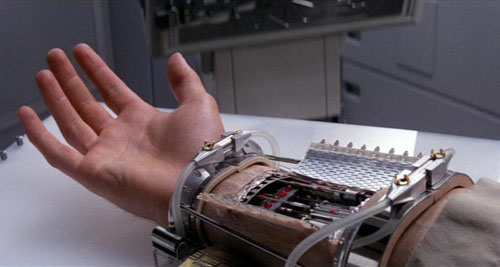It’s been quite a while since I’ve read Dune. I found my way to this interesting conceptualization, Sietch Nevada, through my regular StumbleUpon clicking. For those not familiar with Dune by Frank Herbert, please check it out! It is an excellent novel, as described in my review. I find it interesting how many ideas are drawn from Sci-Fi. Everyday technology like cell phones, video conferencing, and robots (well maybe not everyday yet), were hinted to by authors long before they were developed. I find the Sietch concept intriguing because I lived in Phoenix, AZ for many years. A few years after I left, I started hearing about how Lake Powell, fed by the Colorado River, might dry up soon. I thought that it meant there would be no more water, but experts are referring to “dry” as unable to generate hydroelectric power. So, not only will water levels be low, but there could be power shortages as well!
Sietch Nevada concept straight from Frank Herbert’s Dune
Related Post
The Robot ChroniclesThe Robot Chronicles
I’m going to try something new and post a deal on a book that I plan on reading. There’s a Kindle edition sale on The Robot Chronicles for just 99 cents! This is a compilation of recent stories from a wide range of authors. I’m a huge fan of robot stories so this is sure to be a dollar well spent. Reviewing Asimov’s complete Robot & Foundation Universe was one of the main reasons I created this site. One of the newer authors I’ve been reading is Hugh Howey, featured in this compilation. I’ve thoroughly enjoyed his Wool/Shift/Dust series (sadly not reviewed yet) and look forward to his approach on this subject. This will also be a good opportunity to explore some other authors.
The print price is $15.99, with the Kindle edition going to $5.99 just over 5 days from the time of this posting. Buy now, for less than the cost of a soda!
Kevin Warwick wants to be a CyborgKevin Warwick wants to be a Cyborg
Remember at the end of The Empire Strikes Back where Luke gets his hand chopped off by Vader? During one of the closing scenes, a robot doctor finishes up installing a replacement hand for Luke.
Kevin Warwick did something similar as an experiment, but without the whole getting his hand chopped off step. Instead he put an electrode in his hand that could transmit commands to a robotic hand through radio waves. This was done back in 2002, and somehow I never heard of it. I’m sure Ray Kurzweil would be proud. Check out the video below for more information about how he did this, and some other advances like using rat brain cells to power robots. If you are at all interested in robotics, cyborgs, or AI, you’ll be in for a treat.
Working from home gets a new lookWorking from home gets a new look
There have been quite a few companies that have explored letting employees work from home part time or even full time. Trevor Blackwell, founder of Anybots, is working on a technology that can make interacting with workers still physically at a building much easier. This seems to me to be an early step to a world like I saw in Surrogates. I’m always fascinated when I see science catching up with Sci-Fi. Check out the company’s promo video at the Anybots homepage.

